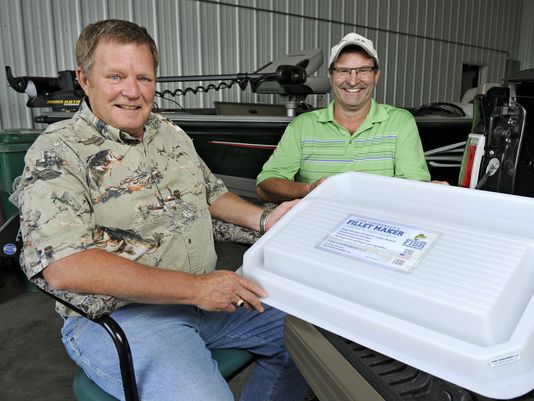【2014-8-9】St. Cloud duo come together to create, sell the Filletmaker
 Tony Schmitt and Mike Theisen have known each other for more than 20 years. Schmitt used to work for a St. Cloud oil company, and Theisen, who has operated Mike's Repair on the East Side for more than three decades, knew Schmitt from business calls.
Tony Schmitt and Mike Theisen have known each other for more than 20 years. Schmitt used to work for a St. Cloud oil company, and Theisen, who has operated Mike's Repair on the East Side for more than three decades, knew Schmitt from business calls.
Schmitt always has had a streak of inventor in him. He designed a stackable bulk oil tank system, Tote-A-Lube, to eliminate the use of 55-gallon drums. Schmitt later sold that business and started another, USA Solutions, 11 years ago. He also developed a disposable mat for the swine industry called Compost-A-Mat.
The common thread for Theisen has been fishing and hunting. They've got something on the line now that made them business partners, and they're not sure how big it might get.
The hook was set on something they're calling the Filletmaker after Theisen came to Schmitt last fall with a suggestion and a question: "He came to me and asked how I go about cleaning my fish," said Schmitt, 61. "I told him I usually do it on my kitchen counter."
Schmitt's routine usually involved newspaper and cardboard and eventually wound up a messy operation with slime all over the cupboards.
"I told him I've got an idea for a product that's perfect," said Theisen, 56. "If we could design it right and have it made, it would allow you to clean your fish on your tailgate — or anywhere for that matter — with virtually no mess."
Theisen envisioned a molded plastic tray with a solid raised deck in the middle. The deck features parallel grooves — shallow in the middle and deeper on the ends — that allows fluid to run off each side into a surrounding catch basin.
They developed rough drawings and used Schmitt's connection with Maple Lake-based Rhino Rotational Molding, which made his oil tanks, to deliver a prototype of high-density polyethylene — the same material used in some cutting boards. Using that, Theisen demonstrated how he could clean fish then ease the edge of a garbage bag over the remains left on the Filletmaker and empty it with a flip. He could hose off the board and be cleaned up in less than a minute.
"I tried it, and there was no mess," Schmitt said. "I could fillet fish in my living room with that thing if I wanted."
It took until just before this year's fishing opener to get the Filletmaker produced in numbers. They measure 31 inches long, 21 inches wide and 4 inches high. The resin has to be melted, molded and cooled, and production capacity is just two per half-hour, or about 80 per week. They hope to increase that with the addition of more molds.
The ones they've made have sold well. With a suggested retail price of $59.95, they estimate sales of 600-700 during June and July. Schmitt and Theisen organized CleanCut Solutions LLC, trademarked the Filletmaker name and are in the yearlong process of obtaining a patent for it.
"When we get these into the hands of someone who would use it, just about everyone has loved it," Schmitt said.
"The key for us is to develop a marketing plan because we're nuts-and-bolts guys. We think we've got something here that can be popular and grow, but we've got to do it at the right pace. If it took off and got too big, we wouldn't be ready to meet the demand right now. At the same time, our feedback has been very good, and we believe we'll have to find a way to generate more units before long."
They key to their success will be distribution. They've arranged for the Filletmaker to be available at Scheels at Crossroads Center, Stop Light Bait, Auto Value stores and SpeedStop stores with bait displays.
The St. Joseph Meat Market also is an outlet. Harvey Pfannenstein, who owns that 66-year-old business, said the Filletmaker was different from other propositions he's heard.
"I get so many dreamers who come along with things they want to sell that sometimes I just roll my eyes when they open their mouths," Pfannenstein said. "But this was different. I used it myself two weeks ago when I was on vacation. ... With what they've come up with, everything stays in the tray. I could see a lot of fish houses and boats equipped with one."
Pfannenstein sees other uses, too.
"I think it would work well for cleaning vegetables and canning, too," Pfannenstein said. "Anything that creates a mess, this localizes it."
That's partly why Schmitt and Theisen this fall intend to develop a smaller version of their board called the Kitchen D Lux. They've seen people use the boards to clean or carve chickens and turkeys.
"I brought home the prototype, and I was all proud and showed it to my wife," Theisen said. "She looked at it a moment and then flipped it over and said she thought it would work better for her as a tray for tacos with all their fixings. It took a second, but then I could see that. The more we've been around, the more we find people using it in different ways."
Schmitt and Theisen have been traveling around to trade shows in another effort to market their product. They didn't divulge what they've invested so far but said they hope to recoup their venture capital within a year.
"So far, I've only had one person tell me we screwed up," Theisen said. "That's because we didn't design it with a cup holder."
